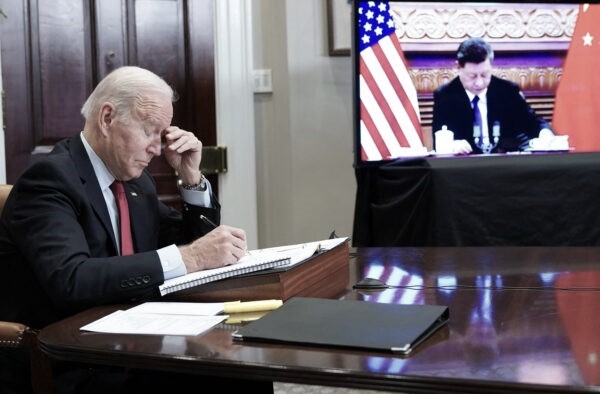
U.S. President Joe Biden gestures as he meets with Chinese leader Xi Jinping during a virtual summit from the Roosevelt Room of the White House on Nov. 15, 2021. (Mandel Ngan/AFP via Getty Images)
By
U.S. President Joe Biden is expected to hold a phone conference with Chinese Communist Party (CCP) head Xi Jinping on July 28, with Taiwan expected to be a key agenda item, as well as a proposed trip to Taipei by House Speaker Nancy Pelosi (D-Calif.).
White House national security spokesman John Kirby told reporters on July 26 that managing economic competition between the two countries also would be a focus of the call.
“This is a call that has been scheduled for a long time and there’s already a pretty robust agenda of things for these two leaders to talk about,” he said during a press call.
“Everything from the tensions over Taiwan to the war in Ukraine, as well as how we better manage competition between our two nations, certainly in the economic sphere.”
The call between Biden and Xi will be the fifth of its kind. It comes amid a continued bottoming out of Sino–U.S. relations on issues of trade and security, as well as serious dustups over the role of Taiwan on the global scene.
Taiwan in the Crosshairs
The CCP claims that Taiwan is a breakaway province of China, and Xi has vowed to unite the island with the mainland and hasn’t ruled out the use of force. However, Taiwan has been self-governed since 1949 and has never been under the control of the CCP.
The United States adheres to a “One China” policy, which means that it doesn’t have official diplomatic relations with Taiwan. Though it doesn’t maintain peer-to-peer ties, the United States is legally bound to provide Taiwan with the arms necessary to defend itself.
U.S.–Taiwan relations have roared back to the fore in the past week after the CCP issued a series of aggressive remarks to the United States following reports that Pelosi was planning a trip to Taiwan.
CCP leadership threatened “forceful measures” against the United States and Taiwan should Pelosi visit. Following the remarks, Biden publicly stated that Pelosi shouldn’t go to Taiwan as a matter of national security, in an apparent concession to the communist regime.
Kirby defended Biden’s statement, noting that Pelosi is in the line of presidential succession, and because of that, her travel is a matter of national security. Only she can make decisions about her travel, he added.
China Rattling the Sabre
Kirby said that the CCP’s “bellicosity” is “unhelpful,” underscoring the increasingly belligerent rhetoric from the Beijing regime in the past several months. The rhetoric, more often than not, has focused on Taiwan and the United States for special harassment and intimidation.
In June, a Chinese general went so far as to threaten U.S. Defense Secretary Lloyd Austin, saying that the CCP would “not hesitate to start a war no matter the cost” to prevent Taiwan’s independence from being recognized.
Meanwhile, the CCP has renewed its own military provocations against Taiwan. Over the past month, the CCP has launched military sorties into Taiwan’s air defense identification zone and even went so far as to falsely claim that there were no international waters in the 100 miles of ocean between Taiwan and the mainland.
The provocations haven’t gone without a response from Taiwan, whose democratic government began a series of drills earlier in the week simulating a Chinese missile attack.
Neither Pelosi nor Taiwan’s foreign ministry has confirmed any travel plans. Pelosi would be the first sitting House speaker to visit the island since 1997. At that time, Speaker Newt Gingrich visited Taipei and issued a warning to Beijing that the United States would defend Taiwan.